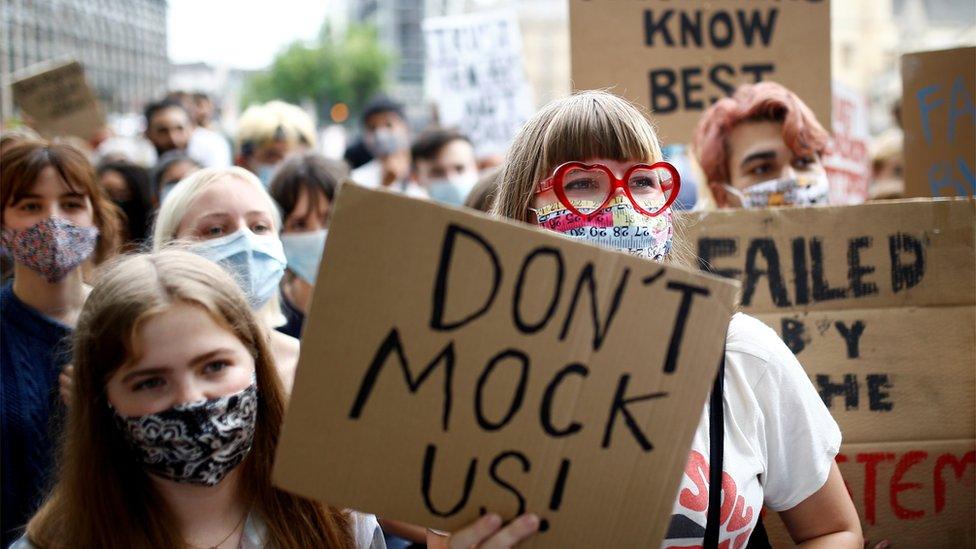Disadvantaged pupils fearful over exam grades
- Published

Students protesting in Parliament Square last year over A-level grades
Many pupils from low-income families in the UK worry they will receive unfair grades this summer, a Social Mobility Foundation (SMF) survey suggests.
More than half of them think they will be unable to appeal, after teacher assessments replaced cancelled exams.
The charity wants governments across the UK to allow all pupils in the final year of sixth form to repeat a year, if their schools approve.
"We cannot afford to get this wrong again," said SMF chairman Alan Milburn.
"Disadvantaged young people have already disproportionally suffered during the pandemic. Levelling up cannot happen without a level playing field.
"If the government is truly committed to prioritising the most disadvantaged, they must have an appeals process that recognises that the pandemic has had a disproportionate effect on those from poorer backgrounds."
The study follows widespread chaos last year when exam grades for pupils across the UK had to be adjusted after protests about the fairness of the grading systems.
Education Policy Institute research last week found further evidence that more disruption to schools had widened the gap in learning between disadvantaged pupils and their more affluent classmates.
The SMF aims to help improve the life chances of children from disadvantaged families in the UK, and surveyed more than 1,500 of them who are high-achieving.
It found that:
38% of them are not confident their grades will reflect their ability
52% lack confidence in their ability to appeal against their grades
35% did not have access to reliable broadband during lockdown
58% felt that not all parts of the UK had suffered equally in the pandemic
As a result of its findings, the SMF is calling for changes to help young people.
It wants the governments in England and Wales to review the grounds for appealing against grades to account for specific challenges disadvantaged pupils have faced.
Scotland has made a special dispensation for those who have faced greater disadvantage.
And it says all young people opting to take exams in the autumn instead of accepting teacher-assessed grades should be able do so free of charge.
Pupils in both Scotland and Wales receive provisional grades this month, which will give them longer to appeal if necessary.
The SMF has enlisted law firm Mishcon de Reya to help pupils to navigate the exams process.
Robert Lewis, head of its education group, says while this year is an improvement on last year's approach, there are still deep flaws.
"Many young people are unlikely to know their rights and what adjustments schools should be making for them," he said.
"This, coupled with the massively unequal impact of learning loss on poorer young people during the pandemic, and a very rigid appeals system, means many young people might not receive the grades they deserve."
A Department for Education spokesperson said: "Teachers know their students best, so we enabled them to choose the evidence they use to assess students - ranging from coursework, classwork and mock questions - and only covering topics which have been taught.
"There will also be a range of internal and external quality assurance checks, and an appeals process where students think there has been an error. Students also have the opportunity to sit exams in autumn and Year 13s will be able to repeat part or all of the year if they feel they have been adversely impacted by the pandemic."